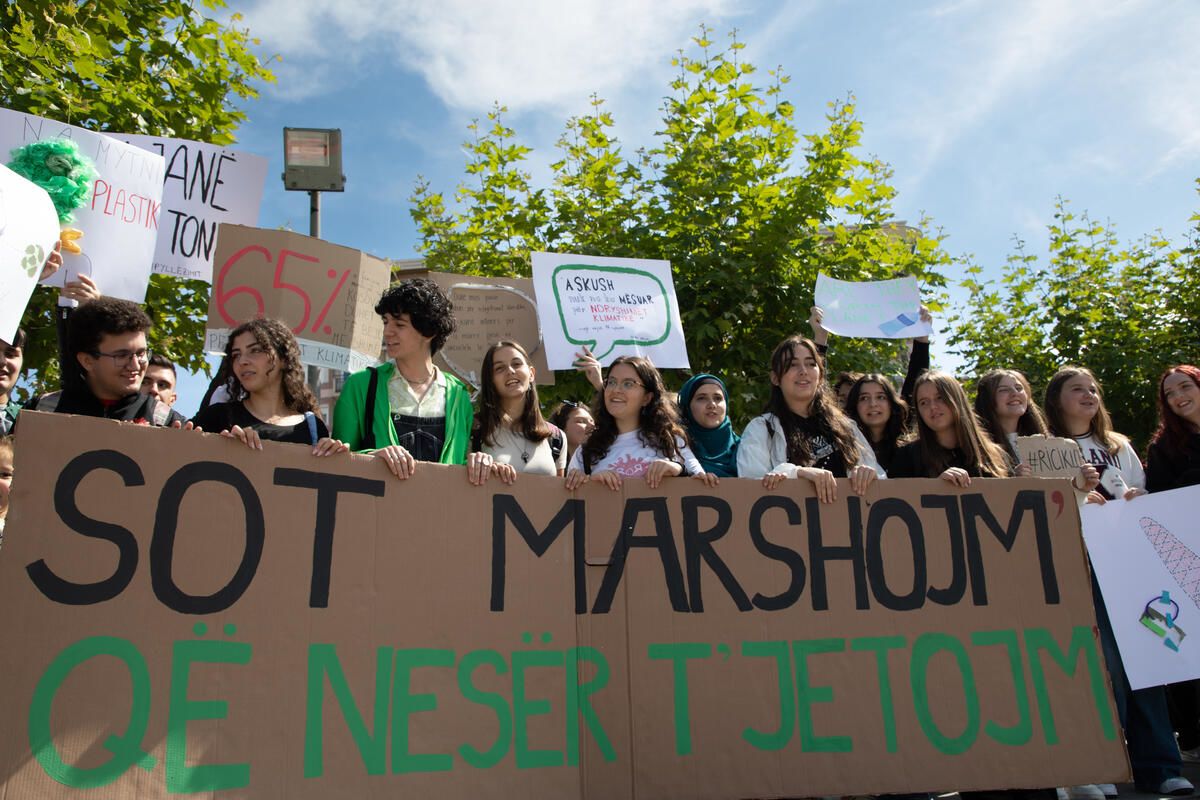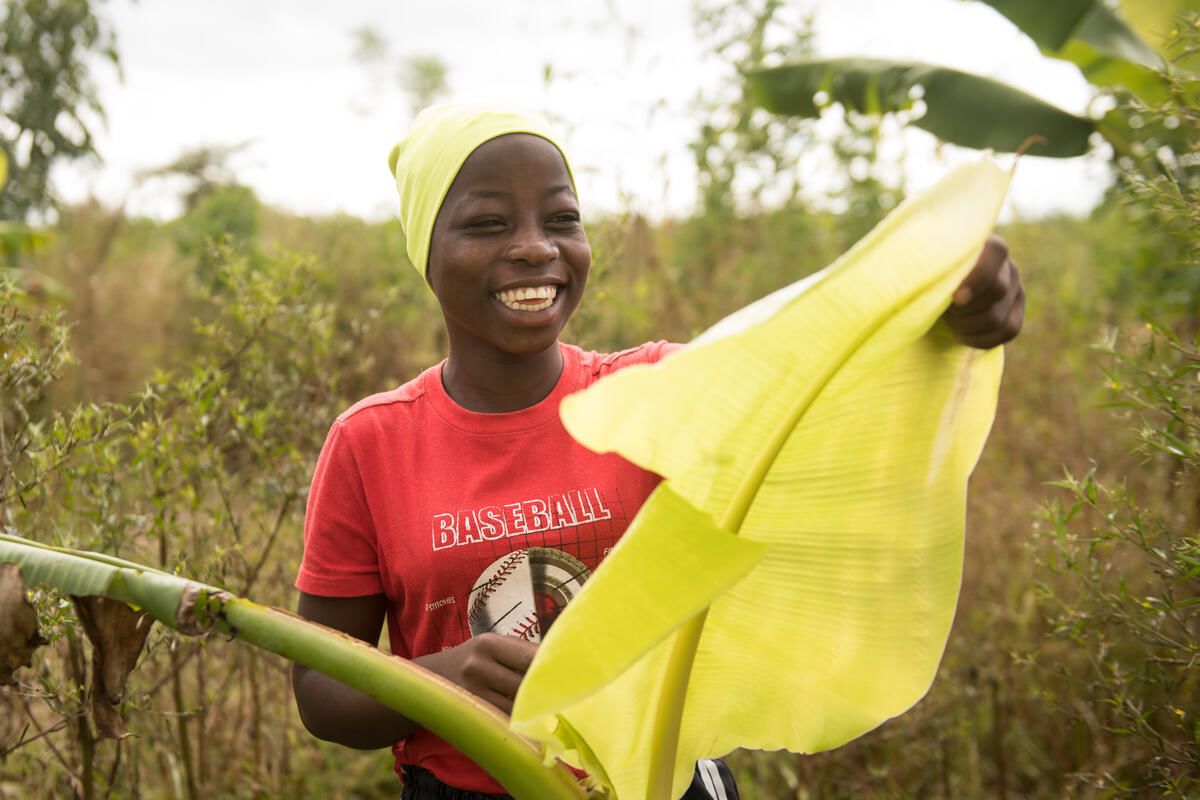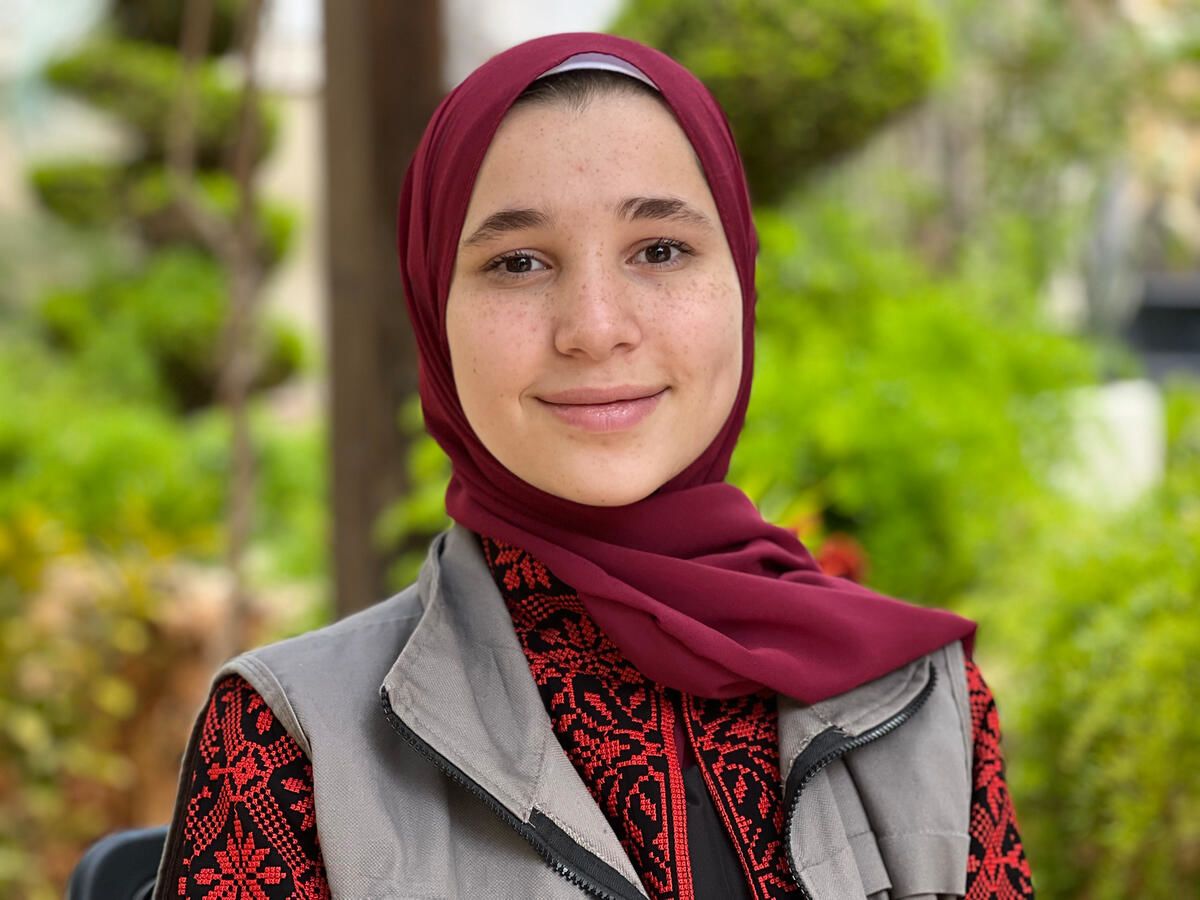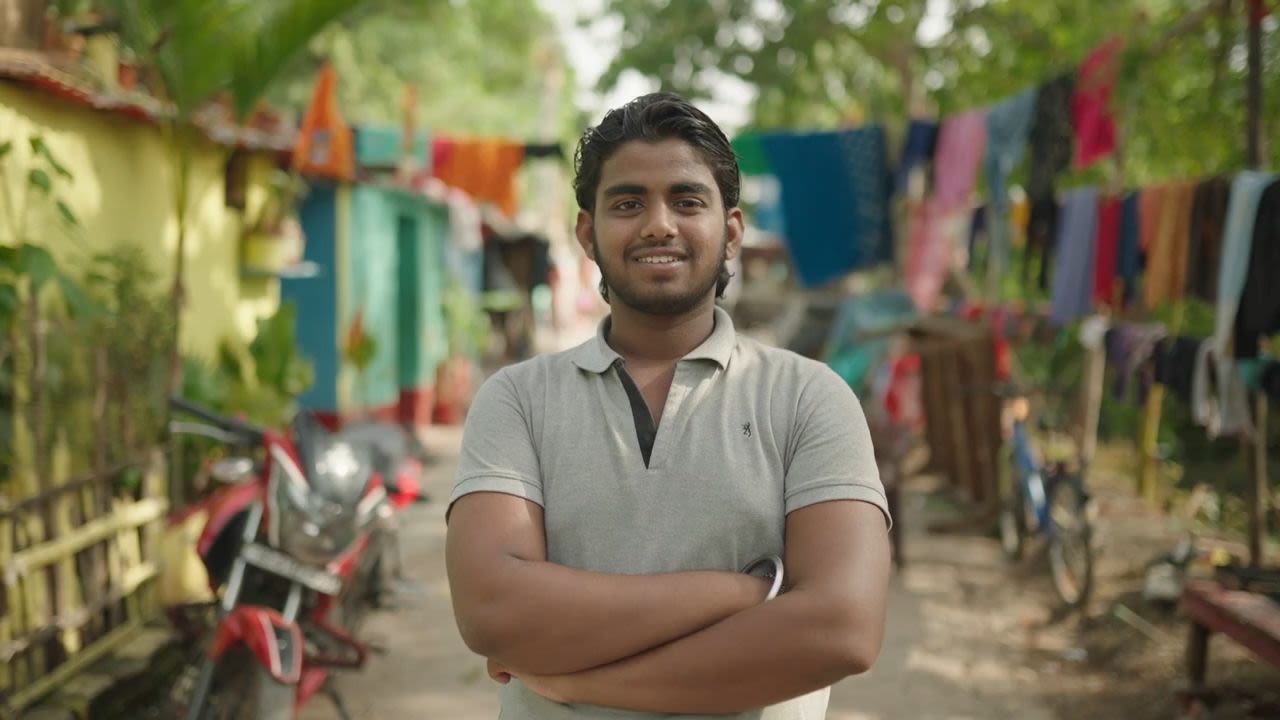MEET THE GENERATION WHO WILL CHANGE THE WORLD
Their creativity, resilience and ambitions are unbreakable. World leaders, take note!

Millions of children around the world are facing the devastating impact of the climate emergency.
Children have contributed the least to the climate crisis but are paying the highest price. They face droughts, flooding and a food crisis, the scale of which the world has never seen before. But, it doesn’t have to be this way.
Children are speaking up and leading the way towards a better world. It’s time for us to follow their lead and listen!
Save the children has consulted 54,000 children from 41 countries, listening to their demands and telling the world and its leaders that it is time to put children first.
We’re calling for urgent action on the climate and inequality crisis to create a safe, healthy and happy future of children everywhere.
Today we are sharing the stories of Esther, Olt, Krishna, Sara* and Oriana*. They are just a few of the inspiring children leading the way to building a greener and more just planet.
Read their stories.
You can jump to a story using the menu along the top of your screen.

ESTHER

The Nature Defender
17-year-old Esther learned about the impacts of climate change at her school, which was supported by Save the Children.
From a young age, she has witnessed the impact of climate change in her village near Zomba, Malawi.
In recent years, she saw her house be knocked down while she and her family were inside. Her family have lost their crops to floods and the people around her have caught diseases brought by extreme weather.
As the climate crisis worsens, these extreme weather events are happening more and more.
Now a climate change champion in her neighbourhood, Esther works with people in her community to replant trees and educate people around her.
Here is Esther's story in her own words.

One year is very hot and the other year very cold, and now there are diseases that result from climate change. During floods there was cholera and diarrhoea.
Before there were little floods but today there is a lot of floods that come out during heavy rain. In 2015 where there were floods and so many properties were eroded away with the floods that came. These floods happened because of deforestation.

Esther stands in the remains of her home that was destroyed by floods in 2015. Photo: Thoko Chikondi/Save the Children
Esther stands in the remains of her home that was destroyed by floods in 2015. Photo: Thoko Chikondi/Save the Children
Deforestation is very bad. There is loss of habitat for the animals because of deforestation and the houses may be flooded away because the trees can support the soil, holding the soil together, so when there are no trees, when the heavy rain comes, that soil will be eroded away.
Climate change may affect so many people and livelihoods because, for instance, when drought comes, it means there is not any food and people may face hunger.
The effects of extreme rain weather upon my life is that the house of my parents fell down because of that rain weather. The crops in the fields of my parents have been eroded away because of those rains. So, I dislike rainy weather so much.
For us to mitigate the climate crisis, we have to plant trees, practise irrigation by water conservation [and] avoid smoke-producing behaviours. When you plant trees, you can have good rain, good air. To help with mitigating the climate crisis, I plant trees.

Esther smiles with one of the trees she planted. Photo: Thoko Chikondi/Save the Children
Esther smiles with one of the trees she planted. Photo: Thoko Chikondi/Save the Children
If I was the president I would encourage people to plant trees and stop smoke-producing behaviour because these behaviours make the country face a bigger climate crisis.

OLT

The Activist
16-year-old Olt is a climate activist and animal lover from Prishtina, Kosovo.
He is the chair of the Commission on the Environment of child-led group Respect Our Rights, which is supported by Save the Children in Kosovo. As a part of his role, Olt helps to organise and participates in activities that promote environmental awareness. This includes everything from environment clean-ups, recycling initiatives and marches.
At the end of September 2022, Olt organised a climate march in Prishtina – roughly one hour away from his home city of Prizren – with other members of Respect Our Rights. 65 children took part to raise their voices on the climate crisis.
He has already seen the impacts of climate change in his town.
Here is Olt's story in his own words.

After joining Respect Our Rights and working more closely with Save the Children, it really opened me up as a person.
In Respect Our Rights we’re from 14 to 17 years old and we take part in different activities.
I believe that wherever I am living, whatever I'm doing, I must give back to the community in case I want to see change in the world.

Olt with the Respect Our Rights group march through the streets of Prishtina calling for climate action. Their sign reads “today we march so that tomorrow we can live.” Photo: Laura Hewison/Save the Children
Olt with the Respect Our Rights group march through the streets of Prishtina calling for climate action. Photo: Laura Hewison/Save the Children
We campaign, we do activism to see a change, to have a better future.
Adults need to hear us because we are more aware of the damage that they have done to our world.
Our opinion is valid no matter the age, no matter who, no matter where we are from.
So, if I was a world leader, protests or climate change wouldn't have to happen because we would already have a very good plan to save the planet. We would already have quit plastic and turned the world into an eco-friendly world to make the cities green and everything. I would listen to children.
If I could tell world leaders something that they need to do and give advice [it] is take action now, literally now.
Usually for us, hero means someone that saved the world. Is that individual. That’s not realistic. Not only one person can save the world, but if hero means each of us to take action to reduce our carbon footprints and to do good things for the environment, then yes, I would consider myself a hero.
So, the area where I live is Prizren. Climate change challenges for Prizren, there's a lot of heatwaves and there is also sometimes can be a lack of water. You can sometimes you cannot even see any water in the river. And I think this is terrible and this is all due to climate change.
For me, the climate crisis in my country, exists, it is growing.
We need to learn from other countries that if we don't take actions now, we will not be able to manage them in the future.
We are the cause of climate change, and we are destroying our own home, our own planet. And that just gives me a fear.
But we, although we destroyed it, doesn't mean that we cannot heal and help the planet.
Children are the best hope for the future because the future is in our hands. We will be living in it, and we will be changing it.


SARA*

The Advocate
15-year-old Sara lives in a refugee camp in Gaza, in the occupied Palestinian territory. She loves nature and has a dream of becoming the Minister of Environment when she’s older.
She has witnessed the impact of climate change on her life and community in Gaza.
As a result, Sara is very passionate about climate action. She has taken part in empowerment sessions run by Save the Children’s partner – Palestinian Centre for Human Rights (PCHR) – and in the Save the Children child hearings in May 2022, where she spoke up about the inequality and climate crisis.
Sara wants to make sure that children’s views and demands are heard by decision-makers.
Here is Sara's story in her own words.

Gaza, as any city in the world, is also affected by climate change. An example of that is the very long winter. There has been a change and this has definitely impacted our lives.
Other disadvantages of climate change on Gaza is when it rains a lot, it causes floods. When there is a lack of rain, many crops cultivated in Gaza need water. So, if a small percentage of rain falls, this will affect the agricultural season.
I love spring the most. But now, the weather is hot during the day and cold during the night, so I have to cancel visiting my friends.
I was invited by Save the Children to address climate change, to learn more about it.

Sara takes part in the Generation Hope child hearing with other children in Gaza. Photo: Randa Ghazy/Save the Children
Sara takes part in the Generation Hope child hearing with other children in Gaza. Photo: Randa Ghazy/Save the Children
In my opinion, to deal with climate change, we should pay attention to nature. We could do this through reforestation and planting trees as much as possible.
We could also raise awareness among people in the refugee camps, to plant between homes if spaces are available, because this will have a positive effect on the Gaza Strip and outside it.

The Gaza strip where Sara lives. Photo: Randa Ghazy/Save the Children
The Gaza strip where Sara lives. Photo: Randa Ghazy/Save the Children
We share this world, adults and children. I was happy that they considered my opinion. I felt that my opinions are valuable to help confront a global issue such as climate change

KRISHNA

The Playwright, Actor and Humanitarian
Krishna lives in a slum community on the outskirts of Patna in the state of Bihar, India. At 17, he is already an inspiring activist and a force for good in his community.
At 10 years old, Krishna joined Save the Children’s child champions programme. At 13 he became the leader of a group of young activists in his neighbourhood who stand up for children’s rights.
He spends his time helping his father run his sugarcane juice business, attending computer class and campaigning. He campaigns on everything from encouraging people to get their COVID-19 vaccinations to waste management and climate change.
Krishna knows the impacts of the climate emergency all too well. In August 2019, Krishna was on the frontlines of the climate crisis himself. A devastating flood washed through his slum, destroying people’s homes and cutting them off from essential supplies.
As a proud activist and aspiring actor, Krishna has combined his two passions by setting up a street theatre group which puts on plays and puppet shows. Krishna has performed a play with his learning group to raise awareness on the climate crisis, water conservation and pollution.
Here is Krishna's story in his own words.

Now, the thing that I like so much, acting, has become my platform to spread awareness among people.
In the act [of the play], we showed how some people chop off trees and burn so many tree logs for Holika Dahan and how they waste water in the name of Holi, the festival of colours. A lot of water is wasted.
Eventually, those people understand and start spreading awareness that water is necessary for living and we will only survive if there is greenery.

Krishna performs a puppet show about extreme heat in his slum in Patna, India. Photo: Saumya Khandelwal/Save the Children
Krishna performs a puppet show about extreme heat in his slum in Patna, India. Photo: Saumya Khandelwal/Save the Children
We live in slums and do not have a brick and mortar roof. We have put a tin on the top instead. Even with the fan switched on, the fan starts circulating hot air, which is why it gets very hot. During winters, we feel very cold.
The river Ganga flows about two kilometres from here. There were floods in 2019. For a week, our houses were filled with the flood water. So, we're constantly facing threats due to climate change.
The most important thing is to reduce pollution. Reduce the use of cars to a minimum and instead use bicycles more. A good amount of trees should be planted. We must stop felling trees. And we must reduce the extent of industrialisation so that the pollution resulting from it can be reduced.
It is not what we should do; it is what we must do.
The way the climate is changing, in the next 5-10 years, these steps will become necessary, and we will have to take them.
[To be a] child champion means that the champions always wish well for their neighbourhood and the community. They take a stand for their society and support everyone in their happiness and sorrow.

Krishna and his friend Vivek do door-to-door campaigning to teach people about climate change in their slum in Patna, India. Photo: Saumya Khandelwal/Save the Children
Krishna and his friend Vivek do door-to-door campaigning to teach people about climate change in their slum in Patna, India. Photo: Saumya Khandelwal/Save the Children
[It’s an] example of how with the help of children, society can be led and how children can voice their opinions with the support of their neighbourhood. Children can try and understand the issues faced by the neighbourhood and how they can contribute towards solving those issues.

Krishna speaks to children about their rights at a school in Patna. Photo: Saumya Khandelwal/Save the Children
Krishna speaks to children about their rights at a school in Patna. Photo: Saumya Khandelwal/Save the Children


ORIANA*

The Feminist Waste Warrior
When she was a baby, her family fled violence in Venezuela. Now 15 years old, Oriana lives with her family in a small village on the outskirts of a Colombian city near the Venezuelan border.
As a passionate climate activist, Oriana feels that people don’t look after the environment.
She has already seen the impact of climate change around her. Oriana has noticed that the heavy rainfall has caused rocks to fall from nearby cliffs and has even stopped children like herself from going to school.
To help protect the environment, Oriana creates crafts out of things that people consider rubbish. When she was 11, she helped build a house called “Chica Street” from plastic bottles filled with sand.
Looking forward, she dreams of bringing together empowered female artists who create art out of rubbish. She wants to run workshops to help people gain awareness about the damage humans are doing to the environment and the solutions to combat further environmental degradation.
Here is her story in her own words.

You can see rubbish everywhere. People don’t look after the environment, they don’t care, they just throw litter everywhere.
We should be more aware and we shouldn’t drop litter because it pollutes and harms the environment.
At school, at home, I recycle. At school, we recycle plastic bottles and cans. We sell them and collect money for the school. At home, we make handicrafts. For example, containers with cardboard, sticks, wood, plastic, and things like that. We store things, coins, pencils, etc.
I want to do a campaign in which once a week there are no cars, so people walk or cycle, so we protect the air and the environment and have less pollution.

Close ups of a house called 'Chica Street' that Oriana helped to build out of recycled plastic bottles in Norte de Santander, Colombia. Photo: Pascale Mariani/Save the Children
Close ups of a house called 'Chica Street' that Oriana helped to build out of recycled plastic bottles in Norte de Santander, Colombia. Photo: Pascale Mariani/Save the Children
They [an organisation of women] wanted to build a house, but they didn’t have any money and they saw here there were many containers, so they said why don’t we make a house of them? All day long, from morning to night, every day with a container, a stick, and we mixed sand. It was difficult but we kept building. There are more than 500 bottles and they were all done by hand by just women. It was a great goal to build this house. It was an ecological house.

Oriana fills a plastic bottle with sand so it can be recycled as a brick. Photo: Pascale Mariani/Save the Children
Oriana fills a plastic bottle with sand so it can be recycled as a brick. Photo: Pascale Mariani/Save the Children
One of my dreams is to have an association of empowered women and girls who come through and to do ecological handicrafts so people can see all that can be done with the things they consider rubbish, but it’s not.
I would like adults to learn that we can do many things with the stuff they throw away. We want to protect the environment because it’s our life, and the life of their children, of our children and grandchildren and great grandchildren and so on.
There are many things I’d like to change in this world. First of all, inequity. For example, giving more opportunities to women. It’s very difficult for women to get a job, and if they get it, it’s a lower-income job than men. Men have executive and important jobs. So why can’t women?
Yes, I consider myself a feminist, always fighting for women to be equal to men. And I’ll never stop fighting.

Oriana poses in front of 'chica street', a house she helped to make out of plastic bottles filled with sand. Photo: Pascale Mariani/Save the Children
Oriana poses in front of 'chica street', a house she helped to make out of plastic bottles filled with sand. Photo: Pascale Mariani/Save the Children
The biggest change [in climate] I’ve seen was it was sunny one day and the next day, it rained really heavily. It seemed pretty abnormal.
When it rains, the rubbish is washed out. It smells bad and we can’t cross the bridge because it’s full of rubbish and it makes us sick.
I’m a bit scared when it rains heavily. I have been since I was a child. In the past, I lived in a house near a cliff. One day there was a storm. It rained so heavily that the house where I lived collapsed. So, we have to be very careful, one of those rocks could squash us!
Also, we’re affected because pipelines flood and we can’t go to school because we can’t cross over.
Water is also often scarce. We have to wait around eight to 15 days to get water. We have to recycle water so it lasts longer and things like that.
We can do something for climate change. We can help this world to be different, so there is more life and hope. We can change the world.
We have to protect this world because otherwise what’s the future for our children and for us.



World leaders have a window of opportunity to put children first as they meet to discuss the global climate emergency. Their decisions will affect children’s futures everywhere.
World leaders must make progress to:
- Urgently tackle the climate crisis by limiting global warming to 1.5 degrees, including by phasing out fossil fuels and taking measures that can lift families out of poverty
- Invest in children by funding strong children’s services and safety nets to help children and families adapt to changes in the climate and cope in tough times.
- Listen to children and give them a seat at the table in decisions that affect their lives now and in the future.
We must listen to children like Esther, Olt, Krishna, Sara and Oriana. We must stand with them and amplify their demands.

